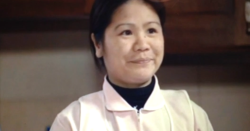Blog
5 Of The Most Ridiculous Plotlines On Lebanese ‘Musalsalat’ (Series)
N.B This post was originally published in July 2016.
You’ve got your telenovelas in Latin America and your soaps in the US and Britain, but nothing quite compares to the Lebanese musalsal. Sure, there’s less incest, but no less drama. Weird suicide attempts and cautionary tales of drugs and partying are plenty, from the boy who would only love his mother with the right amount of cocaine, to the subhuman robo-maid, to the legendary scene-exit of the century.
1. Cocaine boy
Cocaine boy has begrudgingly come to live with his mother after spending years thinking she abandoned him. Naturally, when a mother is inadequate, her child becomes addicted to cocaine at the ripe age of 12. When she asks what she can do to make him happy, he lets her know it’s all about the coco.
Without it, he says, he will kill himself. The dramatic look between mother and son which follows has the viewer wondering whether or not mom will call up her friendly neighborhood dealer to win her son’s love.
2. Fabulous Ra’if (Ajyal)
This is perhaps my favorite scene on all of Lebanese television.
Ever feel like you’re trying to leave a friend’s house but can’t figure out how to say bye? Don’t fret, my child. Ra’if will show you how to leave your ex-wife and her lover with flair.
3. The robo-maid (Ichk Al Nisaa)

There’s nothing more cringe-worthy than watching scenes depicting domestic workers as dehumanized robots. One scene in Ichk Al Nisaa encapsulates this through a conversation with Maria and her employers, Jihan and Wissam.
Wissam: “Fi ajmal min Madam Jihan?” (Maria, is there anyone more beautiful than Madame Jihan?”)
Maria: “Of course no.”
Wissam: “She’s beauty no?”
Maria: “Of course yes.”
*Wissam kisses Jihan*
Jihan: “Baby, khalas, shu?” (“Baby, calm down.”)
Maria: “Ma3 leh, 3ade, Madam Mister.” (“No problem, it’s okay, madam and mister.”)
The awkward part is the monotone, robotic way that Maria responds to her employers, sounding like a trained dog more than anything else. She is never heard from again, and all other helpers in the program are called to bring Nescafe or to open doors.
4. Suicide girl


Suicide is a common theme deployed. Take Ajyal’s approach. Melissa, who is visiting her aunt and uncle in Lebanon for the summer, decides to let loose. Not yet 18, she bribes a lifeguard to get her into a club, has sex with him, and then tries to blackmail him.
When her aunt and uncle find out about her lies and her wild ways, the ask her, shocked, why she has chosen to do such things. Melissa, who comes from a more boring and stifled life in Qatar, tells her aunt it was the land of the devils which corrupted her, a.k.a. Lebanon.
In an overly dramatic and disproportionate scene, Melissa fights with her aunt and uncle, screams like a banshee, runs to the balcony, and hurtles over it, flying over the edge. The moral of the story? Don’t party too hard in Beirut.
5. Suicide girl II
And then there are these suicide attempts.
Just like the post says, killing yourself on Lebanese TV has never been so easy. Just wear your party clothes (the higher the heels, the better), grab a big ass knife, place yourself on the kitchen floor, and call up a friend. Don’t forget to look fabulous.
You’ve got your telenovelas in Latin America and your soaps in the US and Britain, but nothing quite compares to the Lebanese musalsal. Sure, there’s less incest, but no less drama. Weird suicide attempts and cautionary tales of drugs and partying are plenty, from the boy who would only love his mother with the right amount of cocaine, to the subhuman robo-maid, to the legendary scene-exit of the century.
1. Cocaine boy
Cocaine boy has begrudgingly come to live with his mother after spending years thinking she abandoned him. Naturally, when a mother is inadequate, her child becomes addicted to cocaine at the ripe age of 12. When she asks what she can do to make him happy, he lets her know it’s all about the coco.
Without it, he says, he will kill himself. The dramatic look between mother and son which follows has the viewer wondering whether or not mom will call up her friendly neighborhood dealer to win her son’s love.
2. Fabulous Ra’if (Ajyal)
This is perhaps my favorite scene on all of Lebanese television.
Ever feel like you’re trying to leave a friend’s house but can’t figure out how to say bye? Don’t fret, my child. Ra’if will show you how to leave your ex-wife and her lover with flair.
3. The robo-maid (Ichk Al Nisaa)

There’s nothing more cringe-worthy than watching scenes depicting domestic workers as dehumanized robots. One scene in Ichk Al Nisaa encapsulates this through a conversation with Maria and her employers, Jihan and Wissam.
Wissam: “Fi ajmal min Madam Jihan?” (Maria, is there anyone more beautiful than Madame Jihan?”)
Maria: “Of course no.”
Wissam: “She’s beauty no?”
Maria: “Of course yes.”
*Wissam kisses Jihan*
Jihan: “Baby, khalas, shu?” (“Baby, calm down.”)
Maria: “Ma3 leh, 3ade, Madam Mister.” (“No problem, it’s okay, madam and mister.”)
The awkward part is the monotone, robotic way that Maria responds to her employers, sounding like a trained dog more than anything else. She is never heard from again, and all other helpers in the program are called to bring Nescafe or to open doors.
4. Suicide girl


Suicide is a common theme deployed. Take Ajyal’s approach. Melissa, who is visiting her aunt and uncle in Lebanon for the summer, decides to let loose. Not yet 18, she bribes a lifeguard to get her into a club, has sex with him, and then tries to blackmail him.
When her aunt and uncle find out about her lies and her wild ways, the ask her, shocked, why she has chosen to do such things. Melissa, who comes from a more boring and stifled life in Qatar, tells her aunt it was the land of the devils which corrupted her, a.k.a. Lebanon.
In an overly dramatic and disproportionate scene, Melissa fights with her aunt and uncle, screams like a banshee, runs to the balcony, and hurtles over it, flying over the edge. The moral of the story? Don’t party too hard in Beirut.
5. Suicide girl II
And then there are these suicide attempts.
Just like the post says, killing yourself on Lebanese TV has never been so easy. Just wear your party clothes (the higher the heels, the better), grab a big ass knife, place yourself on the kitchen floor, and call up a friend. Don’t forget to look fabulous.





